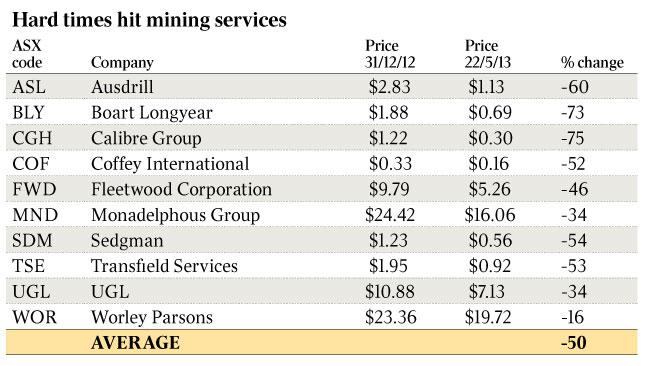Winds of change are roaring in from west
IN just the five months since December 31, 2012, the Australian sharemarket has delivered investors a 10 per cent capital return.

IN just the five months since December 31, 2012, the Australian sharemarket has delivered investors a 10 per cent capital return. But indices hide facts. What I would like to draw your attention to is that the companies that service Australia's resource sector have entered a deep recession.
The Monadelphous Group (ASX: MND) is one of Australia's most successful project management, construction, asset management and maintenance service companies focused on the resource, energy, and infrastructure sectors. Revenue, over the five years to June is expected to jump from $1 billion to $2.6bn. Mona's interim result for the six months to December 2012, released on February 19, was also pleasing.
However, their outlook commentary was very sobering and incredibly insightful. Here are some of the highlights:
"After two consecutive years of extraordinary revenue growth, the year to 30 June, 2014, is currently anticipated to be a period of consolidation in which the achievement of any revenue growth will be challenging.
"Uncertainty remains regarding the rate of new project approvals in the resource and energy sector as customers reassess their capital expenditure plans and focus their attention on high-return options. Project delays and a slowdown in near-term new major project approvals are likely to reduce the pipeline of opportunities in the medium term."
Fast-forward only three months to May 2013. Woodside Petroleum announced the cancellation of its proposed onshore $45bn development for the 12 million tonne-a-year Browse liquid natural gas project at James Price Point near Broome in Western Australia. The new chief executive of BHP Billiton, Andrew Mackenzie, announced a 35 per cent reduction in the company's annual capital and exploration expenditure, from the current amount of $22bn to a targeted $15bn over the medium term.
Meanwhile, Sam Walsh, Rio Tinto's chief executive, announced Rio will be targeting $5bn in cost savings over the next two years. Commentators are now asking: is the resource super-cycle over?
There are much more important questions Australians need answers to than that.
Over recent weeks, many companies servicing Australia's resource sector have announced severe declines in their outlooks. The extent of this downturn seems to have caught the management of these companies by surprise. You would know that we were not surprised; indeed, we sold all of our mining services exposure in The Montgomery (Private) Fund in April 2012, a year ago.
A casual look at 10 of these companies reveals the average share price decline so far this calendar year is 50 per cent. That's a capital loss of 10 per cent a month! Many of these companies have provided trading updates that should be ringing alarm bells such as: "Worse trading conditions than we saw during the GFC."
"Further delays of major projects impacting revenues in the engineering business."
"Ongoing uncertainty in commodity markets is resulting in the delay to and deferment of a range of resources and infrastructure projects."
And, perhaps most worryingly, "What we are seeing are significant project delays or cancellations that are broader than simply mining."
We believe that the average share price decline of 50 per cent will usher in further severe earnings reductions for resource service companies in the year to June 2014.
Job losses in Western Australia, where anecdotal reports of consumer confidence recall the lows of the GFC, are likely to gain media attention along with the inevitable stalling of the property market there.
A possible but logical progression would then be that this pessimism is spread by the media, across the Nullarbor to the currently indifferent eastern seaboard of Australia's economy at precisely the same time as many stocks look a bit stretched from a valuation perspective.
How investors in somewhat overpriced bank shares respond to the possibility that nascent credit growth is delayed or fails to emerge at all could be interesting to watch.
Sharemarket investors may want to consider their portfolio carefully and pay particular attention to consumer confidence numbers and the valuations of banks and retail stocks.
Successful value investing involves waiting for value to appear and at present there doesn't appear to be any. The winds of change, however, appear to be roaring in from the west, so it may be worth keeping an eye on what Mona is saying.
Roger Montgomery is the chief investment officer of Montgomery Investment Management. Montgomery Investment Management does not own shares in any of the above-mentioned companies.



